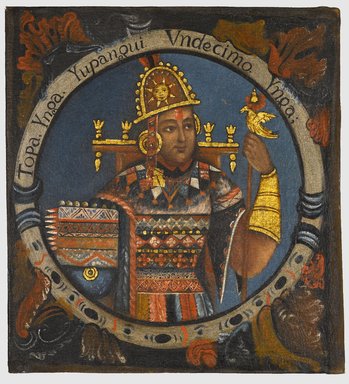Browse

| Accession # | 1995.29.11 |
|---|---|
| Culture | Peruvian |
| Artist | Unknown |
| Title | Tupac Yupanqui, Eleventh Inca, 1 of 14 Portraits of Inca Kings |
| Date | mid-18th century (probably) |
| Medium | Oil on canvas |
| Dimensions | 23 1/8 x 21 1/4in. (58.7 x 54cm) frame: 29 1/8 x 27 5/16 x 2 13/16 in. (74 x 69.4 x 7.1 cm) |
| Inscriptions | Inscribed on roundel: "Topa. Ynqa. Yupanqui Vndecimo. Ynqa;" |
| Credit Line | Dick S. Ramsay Fund, Mary Smith Dorward Fund, Marie Bernice Bitzer Fund, Frank L. Babbott Fund, gift of The Roebling Society and the American Art Council, purchased with funds given by an anonymous donor, Maureen and Marshall Cogan, Karen B. Cohen, Georgia and Michael deHavenon, Harry Kahn, Alastair B. Martin, Ted and Connie Roosevelt, Frieda and Milton F. Rosenthal, Sol Schreiber in memory of Ann Schreiber, Joanne Witty and Eugene Keilin, Thomas L. Pulling, Roy J. Zuckerberg, Kitty and Herbert Glantz, Ellen and Leonard L. Milberg, Paul and Thérèse Bernbach, Emma and J. A. Lewis, Florence R. Kingdon |
| Location | Visible Storage: Case 23, Screen B (Paintings) |
| Description | Portrait of Tupac Yupanqui, the Eleventh Inca King, dressed in the finery of his office and holding a staff in one hand and a shield in the other. This portrait is part of a series of 14 Inca King portraits that is based on the engraving by Antonio de Herrera, which in turn is based on a painted prototype (see Converging Cultures, 1996, p. 239). |
Curatorial Remarks: The blue background of these twelve portraits of Inca kings could have been produced with a variety of pigments that were available in the Viceroyalty of Peru in the eighteenth century: Prussian blue, from Germany; indigo, from the Americas; and smalt, imported from Europe. In the Viceroyalty of Peru, the choice of a blue back-ground for these portraits was strategic, elevating the subjects as blue did in European paintings of rulers and nobles. Following the European tradition, Cuzco’s surviving Inca aristocracy likely commissioned these portraits to document their royal heritage and thus legitimize their political and social authority.